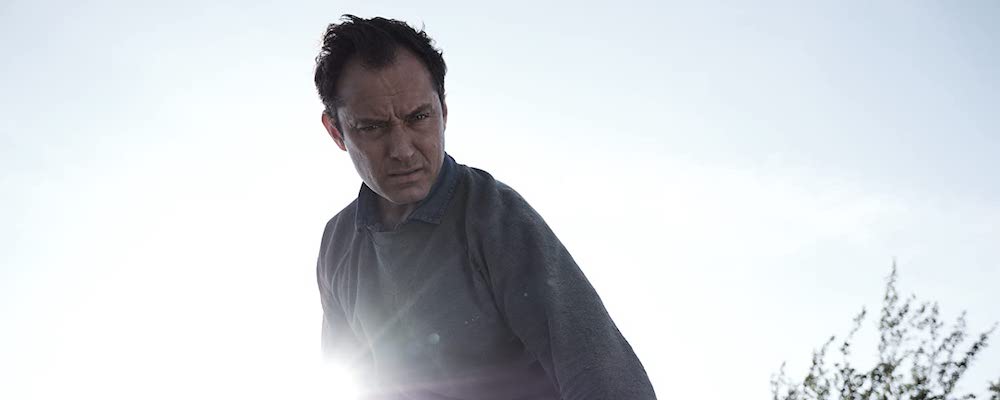Jude Law Enters a World of Desperate Hearts and Cultish Devotion in HBO’s ‘The Third Day’
Alci Rengifo
HBO’s “The Third Day” is a thriller more than apt for our times. It is surreal, bending perceptions of reality at its will, and taps into the fanaticism of groups driven by unshakeable beliefs. By now the whole genre about cults would seem played out, but the atmosphere of this show is easily absorbing, with moments that can’t help but haunt you.
It begins with Sam (Jude Law), who we see by a river letting a small article of clothing be taken by the water. He is on the island of Osea, which has a main road constantly flooded over. Hurrying back, Sam comes across a young girl trying to commit suicide, Epona (Jessie Ross). Sam saves the girl and brings her back to her village, a picturesque, isolated community where the locals practice their own, strange form of Christianity. Among the community leaders are Mr. Martin (Paddy Considine) and Mrs. Martin (Emily Watson), who give Sam room and board. But Sam is losing his patience because he also needs to make an important call to a business associate involving some shady business. While at his lodgings, Sam also meets Jess (Katherine Waterston), a researcher who is an expert on Osea’s rituals which mix Christian beliefs with worship of a Celtic war god. The two develop a friendship but are soon swept up by the island’s gothic intrigues. They partake in strange traditions, which are intensifying due to a drought situation, and start to sense something more dangerous is afoot.
If this were a movie “The Third Day” would have easily rushed from one plot twist to another, or at least given us an adventure in the style of “The Wicker Man.” Split into five episodes, it instead unfolds like a novel, divided into two key sections, “Summer” and “Winter.” The first section is when Sam enters Osea and is pulled into its beguiling atmosphere. From the beginning directors Philippa Lowthorpe and Marc Munden imagine the island as a trippy, surreal landscape, not too dissimilar from the way Ari Aster turned Swedish vistas into druggy hazes in “Midsommar.” Some shots find Sam walking down pathways where only half the woods are in color, the rest washed out in a greyish tint. At first there’s no explanation for this, and there doesn’t need to be. Sam is in an emotionally distraught state because he continues to mourn the murder of his young son not too long ago. He returns to the island because it is where his son went missing, and every year and lets go of one more item of clothing as a form of closure. Through this story angle Sam is given an adequate depth to explain why the cultists of Osea can then manipulate his feelings. Films or shows of this type usually feature a detective or some other kind of rehashed character, but Jude Law conveys real scars in Sam, real pain that can find solace in the neo-paganism of his new lodgings.
As Sam meets Jess, she also reveals her own scars, and what follows in the rest of the first section is a series of hallucinatory moments. “The Third Day” has a ritualistic environment that feels authentic, vividly imagined in its odd ceremonies, like a nighttime party where Sam and Jess take LSD and people seem to float off the ground. Masked men chase Sam down the woods. Who are they? The Martins claim it’s just kids being silly. Sam suspects it has something to do with him constantly asking about how Epona is doing. It all eventually threads into a convincingly scary idea about a society panicking over ecological catastrophe. A drought is beginning to impact Osea’s economy, so its denizens are convinced they must intensify their rituals involving Celtic gods and Christian belief in order to find relief. Their solution involves bloodshed, the taking of human life and other elements Sam and Jess might not be aware they will be a part of. Here is when “The Third Day” becomes an effective parable about times when uncertainty is in the air and people turn to extreme beliefs or ideologies. Are we not living in a time when politics and religious fervor are swirling together in many corners of the country? With the pandemic and now raging forest fires in the west putting everyone on edge, a show like “The Third Day” goes beyond fantasy and taps into something real.
The second half, “Winter,” becomes a bit more of a standard thriller. A woman named Helen (Naomie Harris) arrives on Osea for what seems like a regular getaway. But then she begins to have her own suspicions about the place, and starts snooping around, coming close to finding out about Sam and Jess. However, “The Third Day” does not end on a bombastic note, but a haunting one, with a final shot by a sea shore that raises more questions than answers, but also provides a tragic closing.
“The Third Day” is best not being binged. Every episode is so atmospheric and well-written that it deserves to be savored. Because it also doesn’t depend too much on jump scares, it works best as a weekly where one chapter ends and you have to wait a few days for the next part. We have seen many cults on screen before, but this is a series apt for a time when entire societies are seeking something to believe in.
“The Third Day” premieres Sept. 14 and airs Mondays at 9 p.m. ET on HBO.

